Medicare for Veterans and VA Benefits: A Complete Guide
It’s a good idea for veterans to apply for both Veteran Affairs (VA) health care benefits and Medicare when they become eligible. While the two programs don’t offer dual-coverage, Medicare offers benefits not covered by VA health care and vice versa.

- Written by Christian Simmons
Christian Simmons
Financial Writer
Christian Simmons is a writer for RetireGuide and a member of the Association for Financial Counseling & Planning Education (AFCPE®). He covers Medicare and important retirement topics. Christian is a former winner of a Florida Society of News Editors journalism contest and has written professionally since 2016.
Read More- Edited By
Lamia Chowdhury
Lamia Chowdhury
Financial Editor
Lamia Chowdhury is a financial content editor for RetireGuide and has over three years of marketing experience in the finance industry. She has written copy for both digital and print pieces ranging from blogs, radio scripts and search ads to billboards, brochures, mailers and more.
Read More- Published: May 7, 2021
- Updated: March 21, 2025
- 11 min read time
- This page features 10 Cited Research Articles
- Edited By
To support the health care needs of about 19 million U.S. veterans, government health insurance programs such as VA benefits and Medicare.
While Medicare for veterans and VA health care benefits don’t coordinate their services, it’s still a good idea to apply for both. About half of veterans who have VA benefits also have Medicare coverage, expanding their options for where and how they receive care.
This guide covers everything you need to know about Medicare for Veterans, VA benefits, Tricare for Life coverage and how these programs work together.
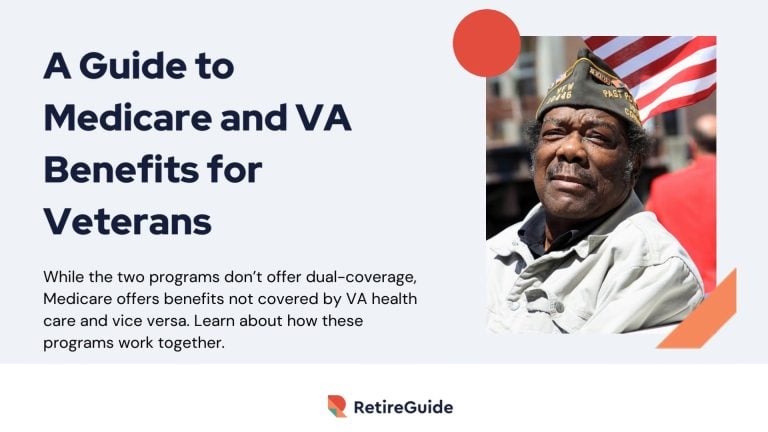
Do I Need Medicare if I Have VA Coverage?
The U.S. Department of Veterans Affairs recommends that you enroll in Medicare when you turn 65, even if you have VA coverage. This provides you with additional coverage options when seeking care outside of VA facilities.
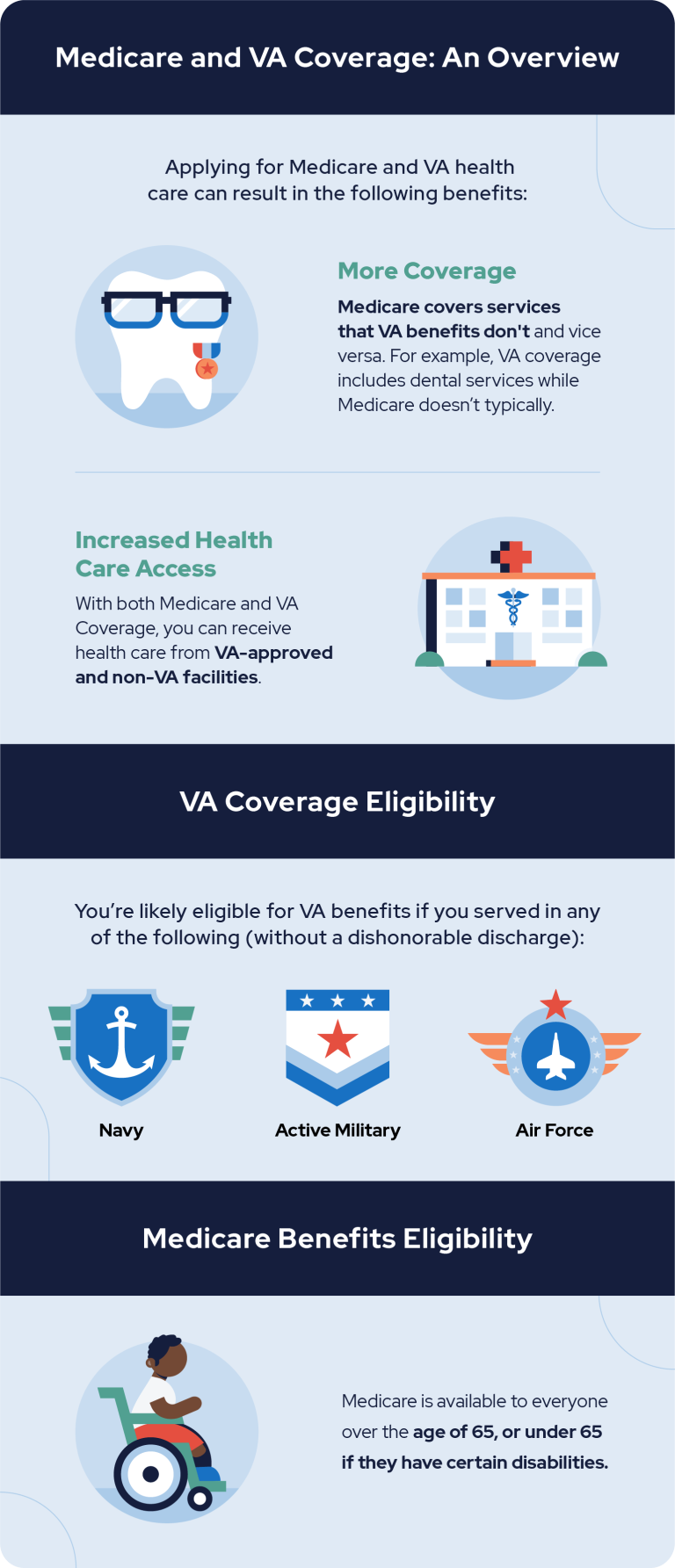
Medicare provides backup options in case there’s not enough VA funding in the future to cover care for all veterans. If funding for VA health care is reduced, those in lower priority groups may be at risk of losing their VA health care benefits.
You should also enroll in Medicare Part B when you become eligible. Delaying enrollment might result in a permanent late enrollment penalty, which increases the longer you delay signing up.
How Do VA Benefits and Medicare Work Together?
VA benefits and Medicare are separate plans that don’t coordinate coverage. Every time you receive care, you need to decide which program’s benefits to use. You would use your Veteran Health Identification Card when accessing care at VA facilities and your Medicare card at other facilities.
That said, applying for both programs benefits veterans since each program offers unique coverage options.
Medicare and VA Coverage Compliment One Another
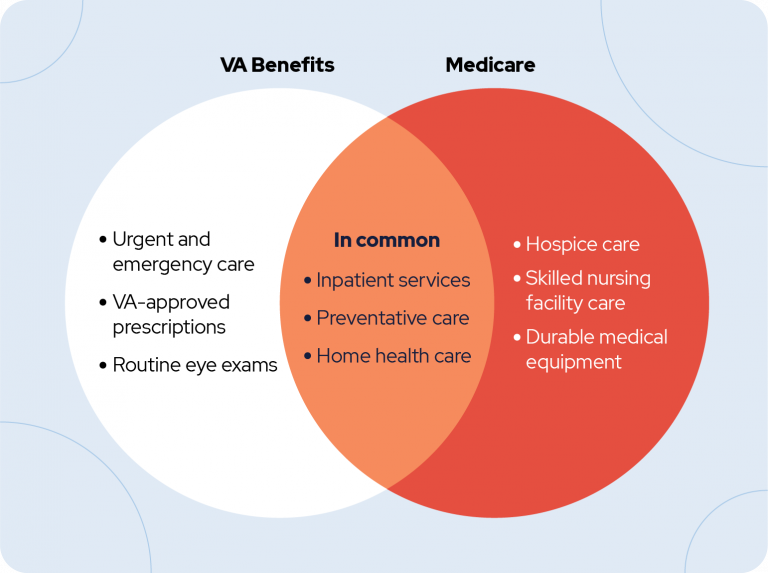
- Inpatient care
- Outpatient health care services
- Home health care
- Medically necessary services
- Preventative services
- Inpatient hospital services
- Preventive care
- Home health care
- Emergency care services
- Mental health services
While Medicare generally doesn’t cover routine dental, vision or hearing care, some veterans can qualify for dental and vision coverage through VA benefits. On the other hand, Medicare covers hospice and skilled nursing facility care while VA health care does not.
Where Do I Access Medicare and VA Benefits?
VA benefits cover services at VA-authorized or non-VA facilities with pre-authorization, whereas Medicare helps cover services at non-VA facilities.
- VA medical centers
- VA community-based outpatient clinics
- Vet centers
- VA community living centers or other assisted living facilities
Consider factors such as budget, convenience and the type of care you need when deciding whether to go to a VA or non-VA facility. The chart below compares the advantages and disadvantages of the two.
| VA Facilities | Non-VA Facilities | |
|---|---|---|
Pros
|
|
|
Cons
|
|
|
Check for VA-approved facilities near you to see if there is one you can conveniently access. If not, it could be worth signing up for Medicare to ensure you aren’t too far from a clinic in the event a health issue arises.
VA Health Care Eligibility
According to the Department of Veterans Affairs, “You may be eligible for VA health care benefits if you served in the active military, naval, or air service and didn’t receive a dishonorable discharge.”
Those who enrolled in uniform services after September 7, 1980, or started active duty after October 16, 1981, must have served for two years or completed their active-duty period unless they meet certain exceptions, such as:
- Discharge due to an active duty-related disability
- Early discharge
- Serving before September 7, 1980
If you were or still are in the military reserves or National Guard, you can qualify for VA benefits if you completed your active-duty period as required by a federal order.
- Fill out an online application on your VA.gov account
- Call 877-222-8387 Monday to Friday from 8 a.m. to 8 p.m. Eastern Time
- Fill out and mailing the application form
- Apply in person at a local VA medical center or clinic
- Enlist an accredited representative to help apply for VA benefits
After submitting your application, you’ll receive a letter in less than a week stating whether your application was approved or not.
VA Priority Groups: What You Need to Know
After your VA benefits application is approved, you’re assigned to one of eight priority groups that determine your potential health care costs and when you’ll be signed up for health care benefits.
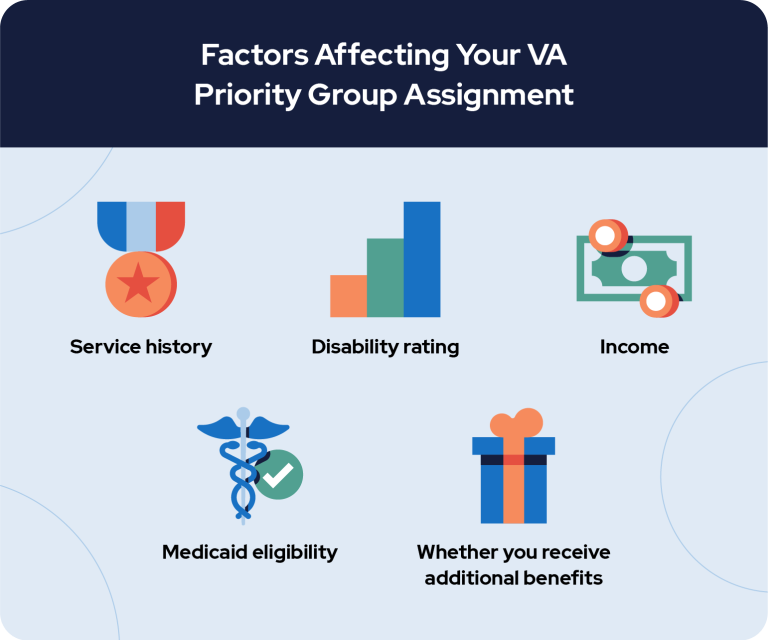
- Your service history
- Your disability rating
- Your income
- Your eligibility for Medicaid
- Whether you receive additional benefits
Veterans with service-related disabilities are put in the highest priority group, whereas veterans with higher incomes who don’t have any service-related disabilities are generally put into lower priority groups.
Medicare Eligibility
Medicare eligibility requirements apply to veterans the same way they do other enrollees. Medicare is available to veterans over the age of 65 or under 65 if they have certain disabilities.
You’ll automatically be enrolled in Medicare Parts A and B if you receive Social Security or Railroad Retirement Board (RRB) benefits for at least four months before your 65th birthday.
If you’re not automatically enrolled in Medicare and you delay signing up for Part B, you may have to pay higher monthly premiums.
Additional Medicare Coverage Options for Veterans
You can consider alternative or additional Medicare plans if you want to increase your coverage.
Alternative coverage options include:
- Medigap
- Medigap plans can be added on to Original Medicare to help cover a portion of the out-of-pocket costs not covered under Original Medicare.
- Medicare Advantage
- Known as Part C, Medicare Advantage plans offer the same coverage as Original Medicare and may include additional benefits such as drug coverage.
- Medicare Part D
- Signing up for a drug prescription plan allows veterans to get covered prescriptions at local pharmacies instead of through the VA mail-order service. There’s no penalty for delaying enrollment in Medicare Part D.
Veterans with Disabilities and Medicare
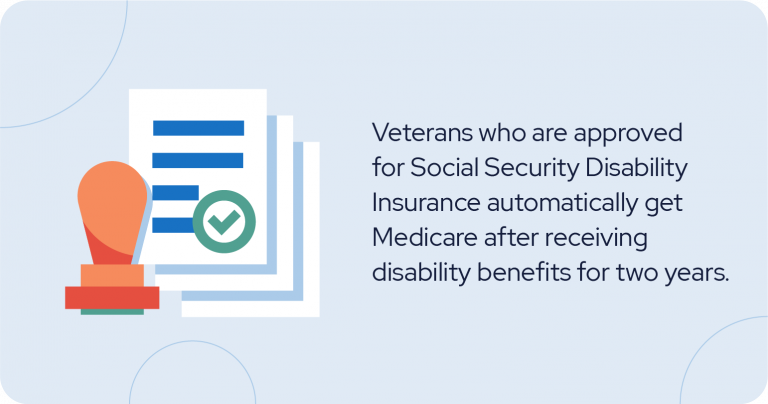
Since veterans with disabilities may qualify for Supplemental Security Income (SSI) or Social Security Disability Insurance (SSDI), you may also be eligible for Medicare based on disabilities under SSDI.
Qualifying disabilities differ between the VA and Medicare. In order to receive disability benefits through the VA, applicants must have a disabling condition that was caused by or worsened because of active duty. Veterans who were discharged may not be eligible for disability benefits.
On the other hand, to qualify for SSI and SSDI, the disability doesn’t have to be service-related, but it must render you unable to do substantial work and must last or be expected to last at least a year. Additionally, your discharge status isn’t taken into account.
- If you receive a 100 percent permanent and total disability rating from the VA
- If you became disabled during active duty on or after October 1, 2001
Once approved for SSDI, veterans automatically get Medicare coverage after they’ve been receiving disability benefits for two years.
Tricare for Life Plans and Medicare
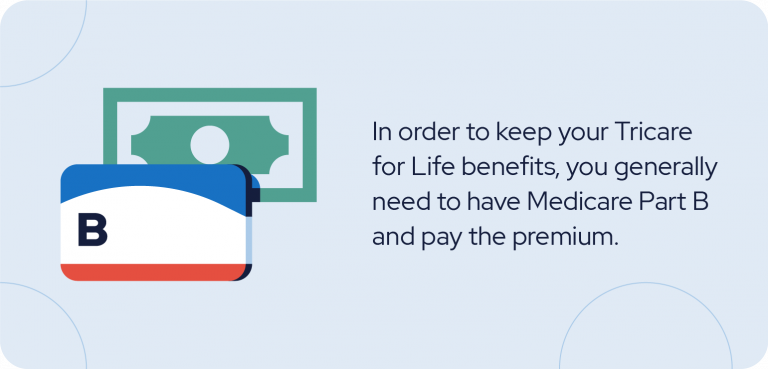
Veterans who are eligible for Tricare and have Original Medicare can be automatically enrolled in Tricare for Life (TFL), a program that provides “wrap-around” Medicare coverage.
There aren’t any enrollment fees, but you generally need to keep Medicare Part B and pay the Part B premium in order to retain your TFL benefits.
If you have group health plan coverage from your employer, you should sign up for Medicare Part B during a special enrollment period in order to get TFL coverage when your group health plan coverage ends.
For services covered by both TFL and Medicare, you won’t have any out-of-pocket costs, unless you’ve maxed out your Medicare benefits. In that case, you’ll have to pay the TFL deductible and cost shares.
For services covered by only one of the programs, you may have to pay the program deductible and a percentage of the costs.
Tricare is the secondary payer to Medicare if you access services at a Medicare-participating, non-participating or opt-out provider in the United States and U.S. territories, and the first payer elsewhere.
FAQs: VA Benefits and Medicare
Common questions about VA benefits and Medicare are related to how the programs work with each other. Below are the answers to some frequently asked questions.
Additional Veteran Health Care Programs
Other health care programs for veterans exist.
- Veterans Benefits Administration
- This page from VA.gov has a collection of resources for veterans, including a list of benefits programs and guides on buying homes, getting pensions and applying for employment.
- Warrior Care
- This page from the Department of Defense provides guides and lists programs that aim to support wounded, ill and injured veterans. It also features resources for military caregivers.
- CHAMPVA Guide
- CHAMPVA is a health care cost-sharing program for the eligible spouse or child of a veteran with disabilities or a veteran who has passed away. The CHAMPVA guide includes the eligibility requirements, how CHAMPVA affects Medicare, how to apply and how to receive care with CHAMPVA.
- VA Disability Compensation
- This page from VA.gov provides information on how veteran disability compensation works for those who got sick or injured or whose medical condition worsened while they were on active duty. It explains how to file for claims and outlines the compensation rates and important dates.
Applying for Medicare and VA benefits helps veterans maximize their health care coverage. While the former offers more extensive coverage for hospice care and medical equipment, the latter covers routine dental, vision and mental health services.
Additionally, coverage from both programs ensures you’re covered at both VA and non-VA facilities. If you aren’t currently enrolled in Medicare, explore your free open enrollment options today.
Connect With a Financial Advisor Instantly
Our free tool can help you find an advisor who serves your needs. Get matched with a financial advisor who fits your unique criteria. Once you’ve been matched, consult for free with no obligation.
10 Cited Research Articles
- TRICARE. (2021, January). TRICARE For Life Handbook. Retrieved from https://tricare.mil/-/media/Files/TRICARE/Publications/Handbooks/TFL_HBK.pdf?la=en&hash=5B2A99B3203B233D320A46A5662D59744721920A68591933408553D483BC8305
- Inderstrodt, J. and Wadsworth S. M. (2020, May 28). Comparing VA and Non-VA Medical Centers. Retrieved from https://www.cnas.org/publications/reports/comparing-va-and-non-va-medical-centers
- Kelly, J., Sergent, J. & Slack, D. (2019, February 7). Death rates, bedsores, ER wait times: Where every VA hospital lags or leads other medical care. Retrieved from https://www.usatoday.com/in-depth/news/investigations/2019/02/07/where-every-va-hospital-lags-leads-other-care/2511739002/
- Chan, D. (2022, February 16). Veterans Rushed to VA Hospitals Have Significantly Better Outcomes. Retrieved from https://healthpolicy.fsi.stanford.edu/news/veterans-rushed-va-hospitals-ambulance-have-better-outcomes-those-treated-non-va-hospitals#:~:text=February%2016%2C%202022-,Veterans%20Rushed%20to%20VA%20Hospitals%20Have%20Significantly%20Better%20Outcomes,transported%20to%20non%2DVA%20hospitals.
- George E. (2022, December 19). Comparing Veterans Affairs and Private Sector Perioperative Outcomes After Noncardiac Surgery. Retrieved from https://pubmed.ncbi.nlm.nih.gov/34964818/
- Social Security Administration. (n.d.). Disability Benefits for Wounded Warriors. Retrieved from https://www.ssa.gov/people/veterans/ww.html
- Social Security Administration. (n.d.). Veterans Who Have a VA Compensation Rating of 100% P&T. Retrieved from https://www.ssa.gov/people/veterans/100pt.html
- U.S. Department of Veterans Affairs. (n.d.). After You Apply for Health Care Benefits. Retrieved from https://www.va.gov/health-care/after-you-apply/
- U.S. Department of Veterans Affairs. (n.d.). Eligibility for VA disability benefits. Retrieved from https://www.va.gov/disability/eligibility/
- U.S. Department of Veterans Affairs. (n.d.). VA Priority Groups. Retrieved from https://www.va.gov/health-care/eligibility/priority-groups/
Calling this number connects you to one of our trusted partners.
If you're interested in help navigating your options, a representative will provide you with a free, no-obligation consultation.
Our partners are committed to excellent customer service. They can match you with a qualified professional for your unique objectives.
We/Our Partners do not offer every plan available in your area. Any information provided is limited to those plans offered in your area. Please contact Medicare.gov or 1-800-MEDICARE to get information on all of your options.
866-749-5443Your web browser is no longer supported by Microsoft. Update your browser for more security, speed and compatibility.
If you need help pricing and building your medicare plan, call us at 844-572-0696

